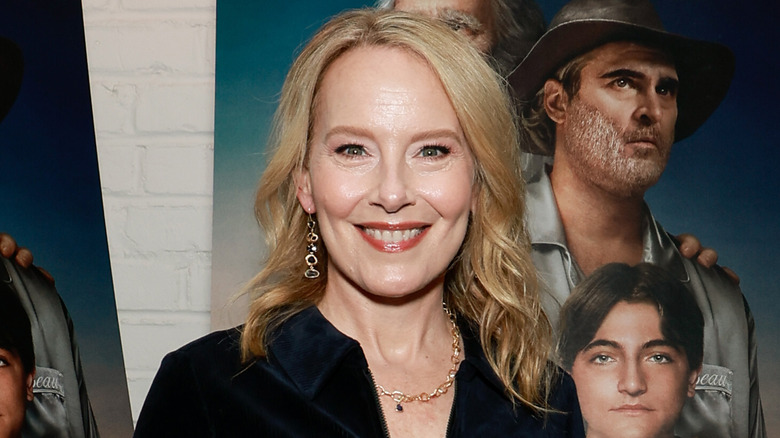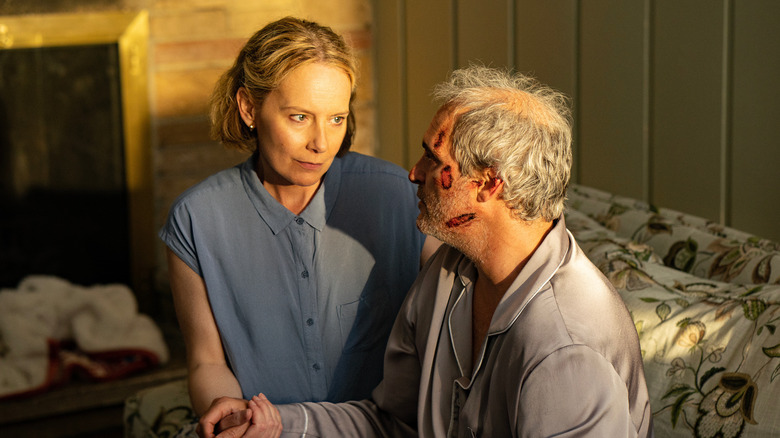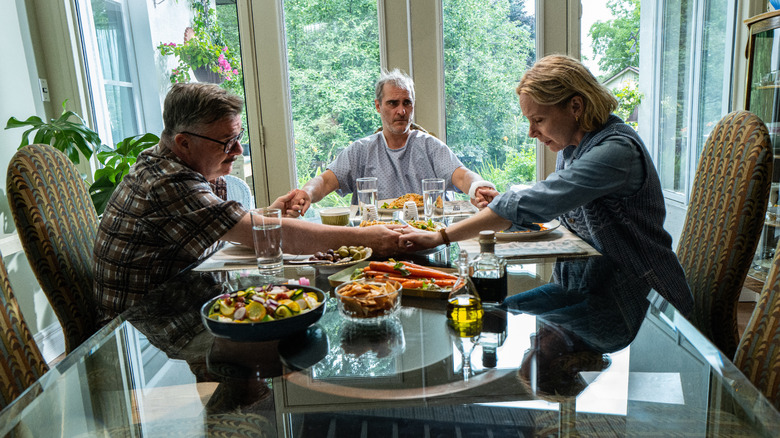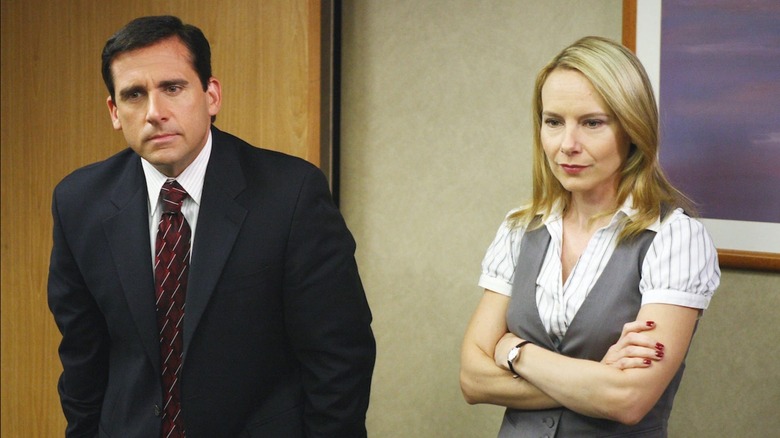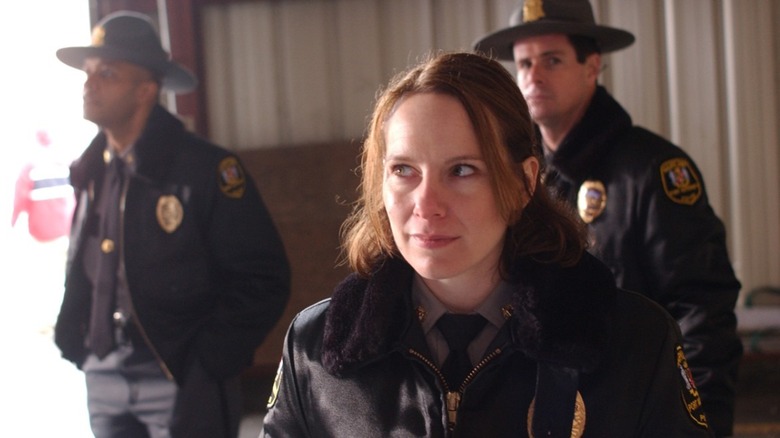Beau Is Afraid's Amy Ryan On Mothering Joaquin Phoenix, Improvising On The Office, And More - Exclusive Interview
Mother issues are at the heart of writer-director Ari Aster's surreal new black comedy, "Beau Is Afraid." In this third feature from Aster — who terrified audiences with "Hereditary" and "Midsommar" — severely repressed protagonist Beau (Joaquin Phoenix) faces a different form of existential horror: the damage done by his tormented, guilt-ridden relationship with his domineering mother (Patti LuPone).
"Beau Is Afraid" opens in the nightmarish, nameless city where Beau lives, as he tries to leave for a trip to visit his mom. But his panic-stricken flight from the hordes of psychos roaming the streets accidentally plants him in front of a van driven by privileged couple Grace (Amy Ryan) and Roger (Nathan Lane), who take Beau back to their suburban home to nurse his wounds. Grace, in particular, shows Beau the kind of motherly love he's been missing — although like everything else in this strange, often exhausting film, nothing is exactly what it seems.
Amy Ryan began her career off-Broadway, while her notable film credits include "Gone Baby Gone," "Before the Devil Knows You're Dead," "Birdman," and the Netflix film "Lost Girls." But many viewers may know her from her celebrated TV appearances, which include starring or recurring roles on "The Wire," "In Treatment," and more recently, "Only Murders in the Building" (in which Nathan Lane also starred).
And then there is "The Office." On the now-legendary comedy series, Ryan played HR rep Holly Flax, the woman whose love finally makes Michael Scott (Steve Carell) leave Dunder Mifflin. Although Ryan's stint on the show was relatively brief, she told Looper in our exclusive interview that it continues to find new viewers a decade after it ended. "That younger generation, they weren't just watching it because it was a funny show," she said. "They're watching it for company, and it became soothing, like a safe place."
Mixing horror and comedy in Beau Is Afraid
This is a picture that's got a lot of tonal shifts. How would you describe the tone of your chapter of the movie?
Ari [Aster] set out to make a black comedy horror film. He's throwing every genre in at once, and once Beau comes to the chapter of Grace and Roger, it's a moment where, as jarring as it is — because the set changes so dramatically and the tone shifts — it's the first time [that] the audience, having watched Beau live through this Kafkaesque world, this dystopian world, can have a little bit of a laugh and a sigh of relief that maybe he's going to be okay. That doesn't last for very long. We are not who we appear to be.
Then the intrigue keeps happening for Beau. Also, our section — because I think of this film as a marathon being run, and each chapter passes the baton to the next, it was up to us — our lap was about, "Okay, you're in a safe comedy world now. It's okay to laugh at us and this situation." That's what Nathan [Lane] and I, our purpose, our presence in this part of the film serves.
How would you contrast Grace, who seems like she wants to be a mother to Beau, to Mona, his real mother, who is this towering, damaging psychological presence in his life?
Grace is a great contradiction because she is deeply loving to Beau. She genuinely cares about him. She's still traumatized by the death of her son, yet she is an absent parent to her living child who is struggling, her teenage daughter who's pretty much forgotten. She's kicked her out of her own room for this stranger to come in and live there. Grace is all loving but deeply flawed. In terms of Beau's story, in some weird way, he might be better off with Grace than Mona, but that's for Beau to figure out.
Acting opposite Joaquin Phoenix and sticking to the script
What was it like to work with Joaquin Phoenix, and what surprised you the most about working with him?
He's a beautiful, charming, generous man. He's very much deep into his work. He won't do anything if it's not truthful, but he's very approachable. He's not standoffish. It's not that you can't go up and talk to him and ask him about his day and his family or how is his dinner ... His talent, which is inexplicable — he has it ready at the quick for him. I don't know how he does it. I wish I did. He is able to pick it up and drop it on a dime so he can be laughing belly laughs with you one second and then cameras are rolling and then he's in this phenomenal performance. He's not revving up, warming up. He's so dialed in, in Olympic 10th-of-a-second speed. It's staggering to see in person.
Do you find that to be a rarity in actors? Do you need a little bit of that time or a little bit of a buffer between being yourself off to the side of the set and then being on camera?
I'll use myself as an example. It's not so much that I need time to like, "I have to shed Amy before I play Grace." It's more I have to be quiet so I can concentrate so I remember the lines and remember that sound asked me not to stand behind the chair because the boom mic ... All those things. I have to stay quiet before we roll or something to remember my assignments.
Does Ari keep everything pretty tightly on book, or did you and Nathan get a chance to do some improvisation during your scenes?
We're tightly on book, but there were a couple of moments where he said to Nathan, "Don't worry about the lines. Just keep him in the house. If the lines managed to get in there, that's great, but don't worry about it." It's a bit of both, but for the most part... Obviously, Nathan can improvise anything. He's a master at it, but coming from the theater where the play is the thing and the written word is gospel, it's our want first and foremost to try to bring truth and life to what Ari wrote. If he took the time to write it, there's a reason. If we can't figure it out, something's wrong. It's our fault. It's not Ari's, first and foremost.
Improvising with Steve Carell and looking back at The Office
Paul Lieberstein once said it was tough sometimes on "The Office" to keep up with Steve Carell's improvising. How did you fare with that?
My recollection — it's so long ago now — but that show was very tightly scripted, and they would come after you and correct you from take to take. But it was an unspoken rule that Steve would start to go off-script after we got the written scenes down a couple of times. He would go off first, and then others would follow gently. Steve is also one of those collaborative, very generous actors who isn't in it for himself to win. He makes you feel like you said the funny thing. It's a nice little hat trick of his, but you're so in the moment, and it's a playful environment, so it doesn't feel fraught to go off script. It feels more fun.
It was a relatively brief period of time for you, but do you sense that generational shift? Do you find new waves of people who want to talk to you about "The Office"?
It's maybe 16-year-olds and 18-year-olds. Once it started on the streamers, that younger generation, they weren't just watching it because it was a funny show. They're watching it for company, and it became soothing, like a safe place. I've heard other people say it: "I'm feeling down, so I put on 'The Office' and started watching reruns." Maybe it's that it's an environment that doesn't even exist anymore. These kids grew up in COVID school, Zoom school, and there's a place where people go to work and they're in the same room and it's about paper. What's paper? It must seem so odd, yet kind of a "less is more" as a comfort.
Maybe it was a simpler time, but certainly not appropriate. How many interoffice relationships? They all should have gone through HR. There are a few things that aren't aging well with the show, but it is nice that it is finding audiences well after its time.
Working with Lance Reddick on The Wire
You starred on another show that became a classic after it was over, "The Wire," and you also got to work with the late Lance Reddick on that. Do you have a specific memory of working with Lance on that show?
I do, and I miss Lance. My first day on the set, I had a scene with Lance, and Lance is ... I think of his character on the show like a stealth bomber. He's so serious and tough, and everything about him is lean. Lance was not that. He loved music, and he was joyous and he was musical in his own speech and almost goofy, and I say that with due respect. It threw me so much — I thought he would be more standoffish and tough and mean like his character — that I couldn't remember my lines. I ended up putting my script on the floor out of camera sight, and this is my first day. I thought, "Oh my God. I'm going to get fired. This is terrible." It was because I was so jarred that Lance was so different from his character. He was a beauty. He's going to be missed.
You have some other pretty big projects coming up. How's the movie "Wolves" going with George Clooney and Brad Pitt and Jon Watts directing? Have you started on that?
I haven't started — I start next week. I'm really looking forward to it. I feel confident it's going to be fun.
"Beau Is Afraid" is out in limited release and opens in wide release on Friday (April 21).
This interview has been edited for clarity.
